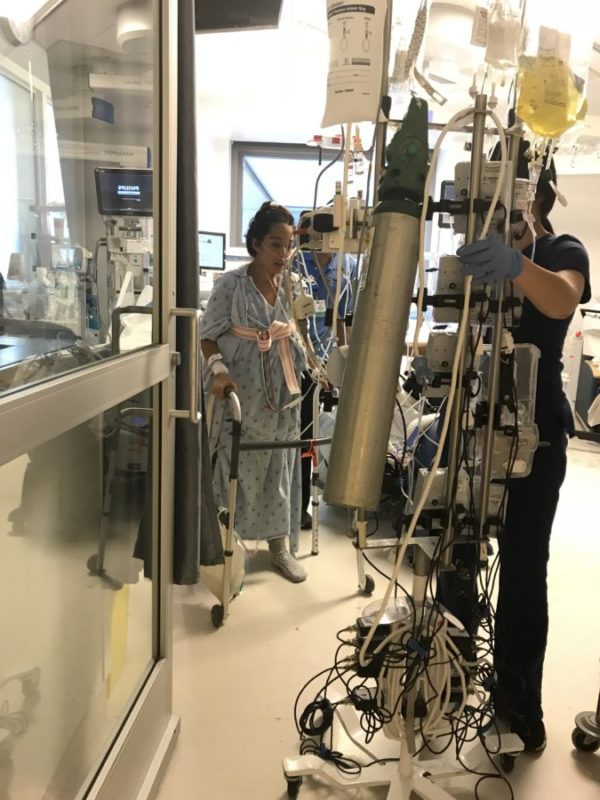A little over a year ago, 23-year-old Santa Clarita resident Jessica Meza was in search of a liver transplant donor after being diagnosed with a rare disease.
Just five days after her story was published in The Signal, Meza’s projected end-stage liver disease score, which ranked her degree of sickness, shot up dramatically.
“From one day to the next, I went from 19 to 39,” she said. “You only have from 6 to 40 — then, after 40, they won’t give you a liver.”
Though she wasn’t feeling well, Meza told her mother she’d just take a nap as she hated going to the hospital, but her mother pushed her to go.
“That day, I must’ve been on autopilot,” said her mother, Theresa Meza. “Everything just fell together. She didn’t fight me on it, she just said, ‘OK.’”
Once at UCLA Medical Center, the doctors realized she was in septic shock and going into organ failure. Meza jumped to No. 1 on the transplant list, but had to wait until her infection was cleared with dialysis to receive a transplant.
Since then, Meza has had a trying journey with plenty of ups and downs along the way, yet on Oct. 2, she gets to celebrate an important milestone — her new liver’s first birthday.

Pre-transplant
At 19, Meza was diagnosed with autoimmune hepatitis and put on the liver transplant list. Until that point, she had thought her fatigue, bloody noses and bruising were normal, but in reality, her body’s immune system had been attacking her liver.
“Just like cancer, there are four stages of this disease and I was already at stage 4,” Meza said in a previous interview.
When you get one autoimmune disease, you’re more likely to get another, and at 20, Meza was diagnosed with her second autoimmune disease, immune thrombocytopenia, which meant her immune system was now also attacking the platelets in her blood.
She then had to undergo chemotherapy treatments to get her platelets up, and while she remained on the transplant list, her disease continued to affect her everyday life.
“I honestly hated living life,” Meza said. “I couldn’t go out, I couldn’t do anything. I felt uncomfortable all the time.”
Yet, she said she kept praying, and on Oct. 2, 2018, because of her worsened condition, she was given a new liver.


Post-transplant
“I actually healed from the transplant pretty well,” Meza said. “I was determined to walk, even if it hurt me — and I was in a ton of pain.”
She wanted to make records and be the first one out of the hospital after getting a transplant. “I didn’t make records, but I was one of the first ones.”
Two days after she went home, she had four aneurysms in her spleen because it had grown to the size of a football as it had been trying to take over her old liver’s duties.
She went back to UCLA and into surgery to cut off the blood supply to the spleen, which was then, in theory, supposed to die and be absorbed by the body.
“It was the most painful thing,” she said, adding that it was the one thing that set her back worse than the transplant.
In total, she spent two and a half months in the hospital, not counting the two days she spent at home in between stays, and was sent home again right before Thanksgiving.
After the transplant, any bodily function she had was celebrated, and she had to re-learn to walk, but she was finally starting to feel better.


“I would do little walks in the neighborhood,” she said, which was when she began to realize “the colors were sharper and brighter and the smell of the earth was stronger.”
Even her sense of touch was more intense — she had never before felt the tingling in her toes when she would get in the shower under hot water.
“It was all super awesome,” she said, smiling broadly. “I felt like a brand new baby.”
Though feeling better, Meza still spent the next few months in and out of the hospital as she was getting migraines and not allowed to take pain medication.
The setbacks continued and, in May, doctors discovered thyroid cancer on her neck, which doctors then removed. In July, when she was still in a lot of pain, doctors discovered her spleen hadn’t been absorbed, which sent her back to the hospital for another month.
“Now, I’m fine,” she said matter of factly.
“This has been a very challenging year, both mentally and physically,” Theresa added. “I look back now at what she’s gone through and what we’ve gone through as a family, and have to take a breath — I’m so grateful. Each day, I see her getting stronger, and each day she’s not in pain is a blessing.”
Though they went through something traumatic, the Mezas continue to have a positive outlook.
“Something as traumatic as this you really see the community, friends and family just really bind together,” Theresa said. “So many people were praying, even complete strangers, when I couldn’t hold it together. I was amazed, and I still am amazed.”


Jessica’s new view on life is something she wishes she could share with everybody.
“Little things don’t matter — it’s so much bigger than that,” she said. “I wake up every morning and I’m like, ‘Thank you.’ A day that I don’t wake up in pain is just such a beautiful and amazing day … The view I have now is just so amazing that I would do it all over again.”
Now, Meza’s just trying to get back to her normal life, with a goal to start a nonprofit for kids with liver disease — not just fundraising, but something they can participate in and know they aren’t alone.
It’s been exactly a year since her liver transplant, and Meza is happy. “I’m throwing a party for my first liver birthday,” she said, laughing.








